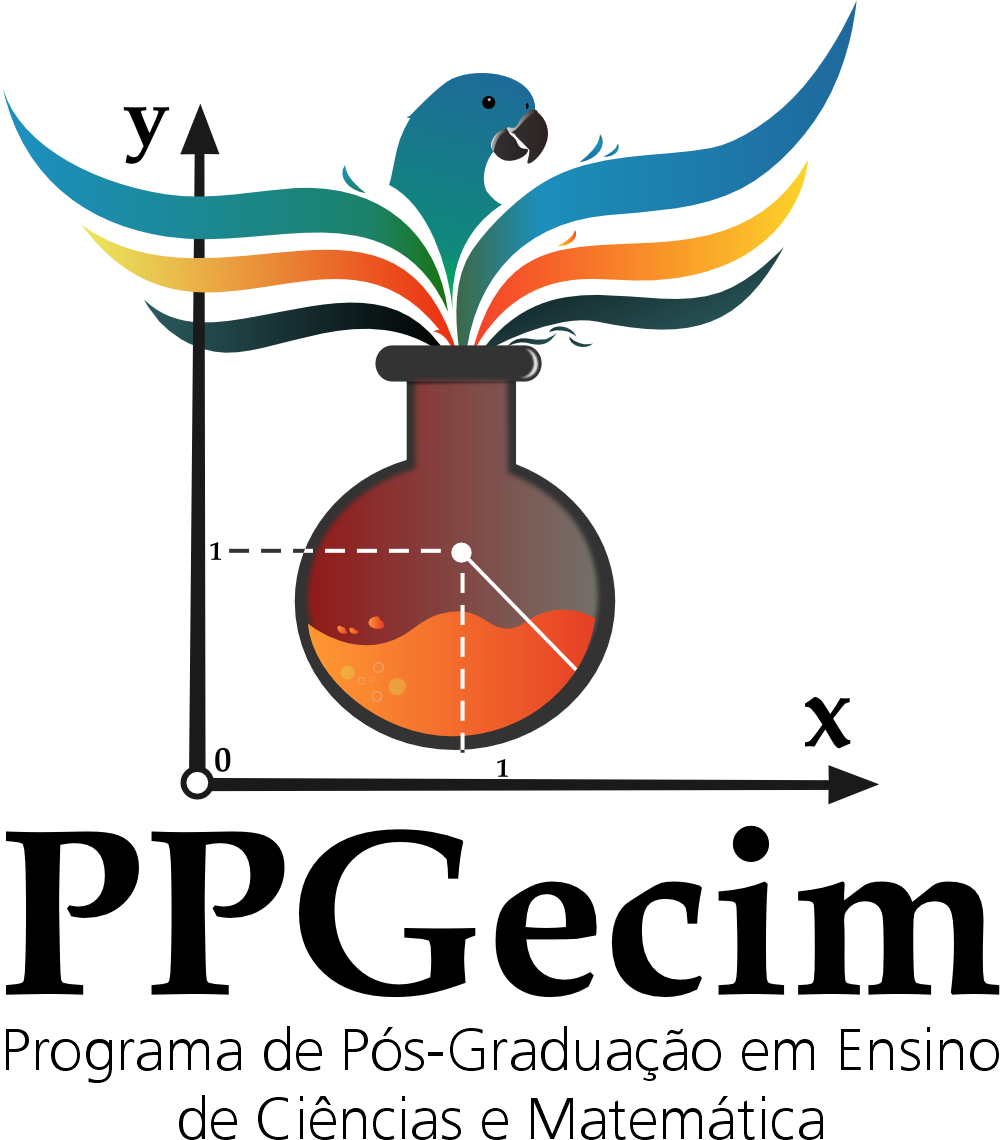ANABOLIC STEROIDS AS A CONTROVERSIAL TOPIC: A STUDY BASED ON THE ABP METHODOLOGY
DOI:
https://doi.org/10.20873/riecim.v3i1.17324Keywords:
Controversies, Scientific and technological literacy, Learning chemistryAbstract
This work aims to investigate how Socio-Scientific Controversies - CSC can promote, through Project-Based Learning - PBL, Scientific and Technological Literacy - ACT in High School students. The similarity of this study is justified by the need to produce innovative knowledge in the area of teaching, referring to Socio-scientific Controversies from the PBL, in view of some gaps in the literature on this relationship. Another important aspect that led to the construction of this research is the search for improvements in the process of learning chemistry content. This study assumes the modality of participant research, being also exploratory, with a qualitative approach. Then, a workshop was held with 4 after-hours classes at a state school in the city of Manaus - AM, and some instruments were used such as: Questionnaires, Mind Maps, Sheets and Folders to carry out the activities. The results were based on Discursive Textual Analysis (DTA) and organized into two discussion axes: PBL and chemistry learning; and the relationship between socio-scientific controversies and students, followed by their respective categories. When analyzing the indicators through the instruments, it was overcome that the activities carried out were sufficient to promote the construction of knowledge and Scientific and Technological Literacy in the students, aiming at the formation of citizens capable of positioning themselves in the face of scientific, social and technological issues that a society.
References
BARON, K. Six Steps for planning a successful Project. Eutopia, San Rafael, 15 mar. 2010. Disponível em: https://www.edutopia.org/stw-maine-projectbased-learning-six-steps-planning. Acesso em: 20 out. 2022.
BELLAND. B. R.; FRENCH, B. F.; ERTMER, P. A. Validity and problem-based learning research: a review of instruments used to acess intended learning outcomes. Interdisciplinary Journal of Problem-Based Learning. Indiana. v. 3, n.1, p. 59-89, 2009.
BENDER, Willian N. Aprendizagem Baseada em Projetos: Educação Diferenciada para o Século XXI. 1° Edição. Penso, 22 de ago. 2014.
CACHAPUZ, A.; GIL-PEREZ; D.; CARVALHO; A. M. P. de; PRAIA, J.; VILCHES, A. A necessária renovação do ensino das ciências. São Paulo: Cortez, 2005.
CARBONELL, J. A aventura de inovar: a mudança na escola. São Paulo: Artes Médicas, 2002.
CHASSOT, A. I. Alfabetização científica: questões e desafios para a educação. Ijuí: Unijui, 2000.
FOUREZ, G. Alphabétisation scientifique et technique. Bruxelles, Belgium, 994.
FOUREZ, G. Alfabetización Científica y Tecnológica: acerca de las finalidades de la enseñanza de las ciencias. 1. ed. 3. reimp. Buenos Aires: Ediciones Colihue, 2005, p. 256.
GIL, A. C. Métodos e técnicas de pesquisa social. 5. ed. São Paulo: Atlas, 1999.
HOFFMANN, Jussara M. Lerch. Avaliação: mito e desafio: uma perspectiva construtivista. Porto Alegre: Mediação, 2005, 35. ed. Revista.
KRUPCZAK, C.; LORENZETTI, L.; AIRES, J. A. Controvérsias sociocientíficas como forma de promover os eixos da alfabetização científica. TEAR - Revista de Educação, Ciência e Tecnologia, Canoas, v. 9, n.1, p. 1 - 20, 2020. https://doi.org/10.35819/tear.v9.n1.a3820
LARMER, J.; MERGENDOLLER, J.R. Essentials for Project-based learning. Educaction Leadership, Alexandria, v. 68, n.1, p. 34-37, 2010.
LÉVY. P. Cibercultura. São Paulo: Ed. 34, 1999.
LIMA-FILHO, D. L.; QUELUZ, G. L. A tecnologia e a educação tecnológica: elementos para uma sistematização conceitual. Educação & Tecnologia, Belo Horizonte, v. 10, n.1, p. 19, 2005. Disponível em: https://periodicos.cefetmg.br/index.php/revista-et/article/view/71. Acesso em: 27 dez. 2023.
MASSON, T. J.; MIRANDA, L. F.; MUNHOZ JR., A. H.; CASTANHEIRA, A. M. P. Metodologia de Ensino: Aprendizagem Baseada Em Projetos (PBL). In: Anais do XL Congresso Brasileiro de Educação em Engenharia (COBENGE), Belém, PA, Brasil, 2012.
MILARÉ, T.; RICHETTI, G. P.; PINHO ALVES, J. Alfabetização científica no ensino de Química: uma análise dos temas da seção Química e Sociedade da Revista Química Nova na Escola. Química Nova na Escola, São Paulo, v. 31, n. 3, p. 165-171, agosto de 2009. Disponível em: http://qnesc.sbq.org.br/online/qnesc31_3/03-QS-0809.pdf. Acesso em: 27 dez. 2023.
MORAES, Roque; GALIAZZI, Maria do Carmo. Análise textual discursiva: processo reconstrutivo de múltiplas faces. Ciência & Educação (Bauru), v. 12, n. 1, p. 117-128, 2006. https://doi.org/10.1590/S1516-73132006000100009
SAMPAIO, M.N.; LEITE, L. S. Alfabetização Tecnológica do professor. Petrópolis: Vozes, 1999.
SILVA, Edna Lúcia da.; MENEZES, Estera Muszkat. Metodologia da pesquisa e elaboração de dissertação. Florianópolis: UFSC/PPGEP/LED, 2000, 118 p.
Downloads
Published
How to Cite
Issue
Section
License
Copyright (c) 2023 Isabela Gonçalves da Gama, Ettore Paredes Antunes

This work is licensed under a Creative Commons Attribution-NonCommercial 4.0 International License.
Copyright Policy
Copyrights are retained by the authors, who grant RIEcim the exclusive rights for first publication. Authors will not be remunerated for the publication of their work in this journal. Authors are permitted to enter into separate, additional contractual arrangements for the non-exclusive distribution of the work's published version in this journal (e.g., post it to an institutional repository, on a personal website, publish a translation, or as a book chapter), with acknowledgement of authorship and initial publication in this journal. The Journal's editors have the right to make textual adjustments and adaptations to conform to publication standards.
Open Access Policy
This journal provides immediate open access to its content, following the principle that freely providing scientific knowledge to the public contributes to the global democratization of knowledge. Users can read, download, copy, distribute, print, search, or use the content for any legal purpose, respecting national copyright laws and without seeking prior permission from the publisher or the author. The opinions presented in the articles are the responsibility of the authors. The Journal does not charge Article Processing Charges (APCs).
Licensing Policy - Usage License
Licensed under the Creative Commons Attribution-NonCommercial 4.0 International (CC BY-NC 4.0) License. This license allows sharing, copying, redistributing the manuscripts published in RIEcim in any medium or format. Additionally, it allows adapting, remixing, transforming, and building upon the material, as long as proper credit is given to the author and initial publication in this journal is acknowledged.

































